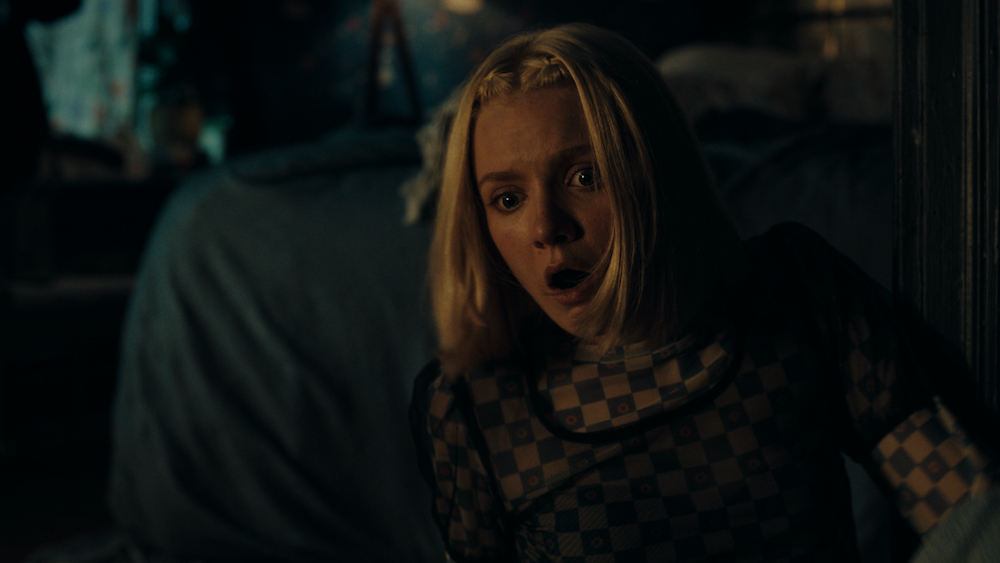
The “evil twin” school of psychological metaphor has been a frequent device in horror fiction, and its familiarity does not much benefit the very literal-minded “Appendage.” Writer-director Anna Zlokovic’s first feature centers on a young Manhattanite whose insecurities manifest themselves in the form of a mini-me who becomes a serious usurping threat. This SXSW-launched Hulu Original is sufficiently polished to pass muster as a night’s streaming entertainment for undiscriminating genre fans. But despite the grotesque premise, its attack is a little too blunt to make much impact, whether taken as thinly-veiled satire or straight fantasy thriller.
Introduced chafing under the critical control of her waspish mother (Deborah Rennard) during a visit home to the suburbs, Hannah (Hadley Robinson) is a nice, talented, attractive twentysomething nonetheless driven by the sense that she’s got everything to prove. An aspiring fashion designer, she certainly gets negative reinforcement on that front from her employer, a stereotypically vicious style maven named Cristean (Desmin Borges). On the plus side, there is very supportive boyfriend Kaelin (Brandon Mychal Smith), and workmate/best friend Esther (Kausar Mohammed), who introduced the couple to one other. But their reassurances tend to fall on deaf ears, as Hannah stays up late each night slaving over dresses her mean-spirited boss will likely dismiss with a sneer.
The cumulative stress begins presenting itself physically, with Hannah experiencing abdominal pain not unlike an unborn child’s kicks. That turns out to be an apt comparison, more or less: Soon she’s giving “birth” to a nasty creature who amplifies all her worst self-doubts, offering a torrent of highly personal, ego-deflating abuse. Initially infant-sized, it grows quickly, and warns “You can’t get rid of me, no matter how hard you try” when she ties it up in her apartment building’s disused basement.
Consulting a doctor without conveying the full extent of her predicament, she’s told she might be have “vanishing twin syndrome” (an actual medical condition) from absorbing a second fetus in the womb. But that isn’t much help. More useful is the support group she discovers for similarly-afflicted people who’ve learned to control the parasites they call their “appendages.”
It is there that she meets Claudia (Emily Hampshire), a fellow sufferer who quickly appoints herself Hannah’s new BFF. Yet the temporarily subdued monster only seems to increase its hold over her psyche, planting paranoid suggestions that Esther and Kaelin are having a secret affair — when in fact they’re increasingly concerned about her mental health. Needless to say, once the “appendage” reaches full size and gets loose, everybody has even worse things to worry about.
Billed as a “horror comedy,” Zlokovic’s film doesn’t embrace either side of that equation zestily enough. The caricatured portrayal of easy targets — a bitchy fashion milieu, a “Karen”-ish suburban mom — lacks any real wit or invention, while the creature menace feels derivative and formulaic despite decent FX work. (Closing credits reveal Hampshire also provides voice for various “appendages,” their rude utterings processed though an irksome electronic filter.)
There’s one good twist toward the end, but nothing here feels original or inspired — particularly the way Hannah’s predicament is a crude representation of low self-esteem, which ultimately gets tamed by professions of self-love to her wounded inner child. These ideas aren’t presented with enough irony or emotional depth to transcend their obviousness. It doesn’t help that the dialogue is often even more on-the-nose, sometimes descending to a childish level of insult, as when one villain abuses a protagonist with the playground oldie “Stop hitting yourself!!”
The actors do OK given the material’s limits, though no one can elevate baddies written in a tenor of one-dimensional superciliousness. Shot primarily in North Carolina (with NYC exteriors), “Appendage” is competently crafted in technical and design departments. But while it’s watchable enough, the material Zlokovic has given herself feels undernourished for a leap to features after a decade of shorts — indeed, her original six-minute 2021 version (which had the omnipresent Eric Roberts as Cristean) feels more satisfying in its brevity.











